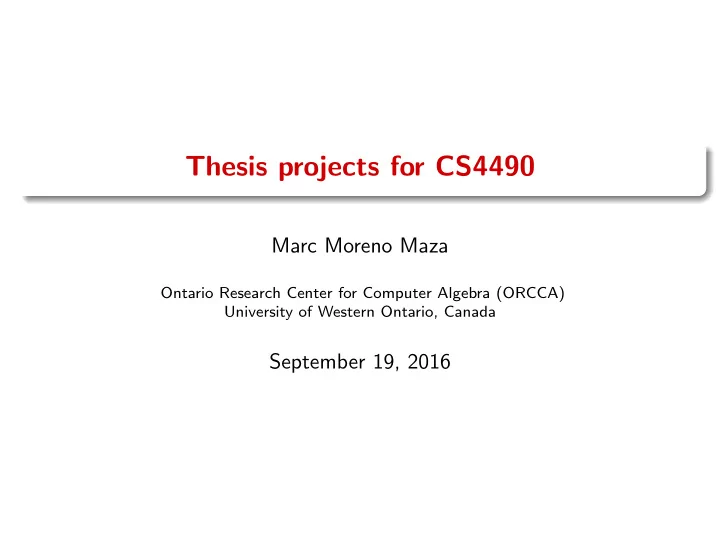

Thesis projects for CS4490 Marc Moreno Maza Ontario Research Center for Computer Algebra (ORCCA) University of Western Ontario, Canada September 19, 2016
Research themes and team members Symbolic computation: computing exact solutions of algebraic problems on computers with applications to sciences and engineering. High-performance computing: making best use of modern computer architectures, in particular hardware accelerators (multi-cores GPUs) Current students PhD: Parisa Alvandi, Ning Xie, Mahsa Kazemi, Ruijuan Jing, Xiaohui Chen, Steven Thornton, Robert Moir, Egor Chesakov MSc: Masoud Ataei, Yiming Guan, Davood Mohajerani Alumni Moshin Ali ( ANU , Australia) Jinlong Cai ( Microsoft , USA), Changbo Chen ( Chinese Acad. of Sc. ), Svyatoslav Covanov ( U. Lorraine , France) Akpodigha Filatei ( Guaranty Turnkey Systems ltd , Nigeria) Oleg Golubitsky ( Google Canada ) Sardar A. Haque ( GeoMechanica , Canada) Zunaid Haque ( IBM Canada ) Fran¸ cois Lemaire ( U. Lille 1 , France) Farnam Mansouri ( Microsoft , Canada) Liyun Li ( Banque de Montr´ eal , Canada) Xin Li ( U. Carlos III , Spain) Wei Pan ( Intel Corp. , USA) Sushek Shekar ( Ciena , Canada) Paul Vrbik ( U. Newcastle , Australia) Yuzhen Xie ( Critical Outcome Technologies , Canada) Li Zhang ( IBM Canada ) . . .
Solving polynomial systems symbolically Figure: The RegularChains solver designed in our UWO lab is at the heart of Maple , which has about 5,000,000 licences world-wide.
Application to mathematical sciences and engineering Figure: Toyota engineers use our software to design control systems
Project 1: Truncated Fourier Transform 1 The Fast Fourier Transform (FFT) is a kernel in scientific computing 2 It maps a vector of size 2 e to another vector of size 2 e 3 The Truncated Fourier Transform (TFT) supports arbitrary vectors but is challenging to implement, in particular on multi/many-cores FFT with artificial zero points TFT removes unnecessary computations Objectives 1 Realize an implementation of the TFT and its inverse map 2 A configurable Python script will generate the CilkPlus code within the BPAS library www.bpaslib.org
High-performance computing: models of computation Let K be the maximum number of thread blocks along an anti-chain of the thread-block DAG representing the program P . Then the running time T P of the program P satisfies: T P ≤ ( N ( P ) / K + L ( P )) C ( P ) , where C ( P ) is the maximum running time of local operations by a thread among all the thread-blocks, N ( P ) is the number of thread-blocks and L ( P ) is the span of P . Our UWO lab develops mathematical models to make efficient use of hardware acceleration technology, such as GPUs and multi-core processors. This project is supported by IBM Canada.
Project 2: Models of computation for GPUs 1 Several models of computations attempt to estimate the performance of algorithms (or programs) targeting GPGPUs 2 The MWP-CWP Model analyzes how computations and memory accesses are interleaved in GPU programs 3 The MCM focuses on memory access patterns and memory traffic in GPU algorithms MWP-CWP Model MCM Model Objectives 1 Compare those models on well-known kernels of scientific computing 2 Can we unify then?
High-performance computing: parallel program translation int main(){ void fork_func0(int* sum_a,int* a) int main() int sum_a=0, sum_b=0; { { int a[ 5 ] = {0,1,2,3,4}; for(int i=0; i<5; i++) int sum_a=0, sum_b=0; int b[ 5 ] = {0,1,2,3,4}; (*sum_a) += a[ i ]; int a[ 5 ] = {0,1,2,3,4}; #pragma omp parallel } int b[ 5 ] = {0,1,2,3,4}; { void fork_func1(int* sum_b,int* b) #pragma omp sections { meta_fork shared(sum_a) { { for(int i=0; i<5; i++) for(int i=0; i<5; i++) #pragma omp section (*sum_b) += b[ i ]; sum_a += a[ i ]; { } } for(int i=0; i<5; i++) int main() sum_a += a[ i ]; { meta_fork shared(sum_b) { } int sum_a=0, sum_b=0; for(int i=0; i<5; i++) #pragma omp section int a[ 5 ] = {0,1,2,3,4}; sum_b += b[ i ]; { int b[ 5 ] = {0,1,2,3,4}; } cilk_spawn fork_func0(&sum_a,a); for(int i=0; i<5; i++) sum_b += b[ i ]; cilk_spawn fork_func1(&sum_b,b); meta_join ; } } } cilk_sync ; } } } Our lab develops a compilation platform for translating parallel programs from one language to another; above we translate from OpenMP to CilkPlus through MetaFork . This project is supported by IBM Canada.
Project 3: Integrating NPI support into MetaFork 1 Currently, the MetaFork language supports different schemes of parallelism: fork-join, pipelining, Single-Instruction Multi-Data. 2 CilkPlus , OpenMP , CUDA code can be generated from MetaFork code by the MetaFork compilation framework Non-shared memory Shared memory Objectives 1 Enhance the MetaFork language and MetaFork compilation framework to support non-shared memory and generate MPI code. 2 This linguistic extension should be compact while allowing to generate efficient MPI code.
High-performance computing: automatic parallelization Serial dense univariate polynomial multiplication for(i=0; i<=n; i++){ for(j=0; j<=n; j++) c[i+j] += a[i] * b[j]; } GPU-like multi-threaded dense univariate polynomial multiplication meta_for (b=0; b<= 2 n / B; b++) { for (u=0; u<=min(B-1, 2*n - B * b); u++) { p = b * B + u; for (t=max(0,n-p); t<=min(n,2*n-p) ;t++) c[p] = c[p] + a[t+p-n] * b[n-t]; } } We use symbolic computation to automatically translate serial programs to GPU-like programs.This project is supported by IBM Canada.
Project 4: Dependence analysis for parametric GPU kernels 1 For performance and portability reasons, GPU kernels should depend on program and machine parameters. 2 Standard software tools for automatic parallelization do not support parametric GPU kernels. But MetaFork almost does . . . Iteration space after change of coordinates Input iteration space Objectives 1 Extend the MetaFork framework with a software component for doing dependence analysis on parametric code. 2 Note that the MetaFork framework already has the infrastructure to generate parametric GPU kernels.
Research projects with publicly available software www.bpaslib.org www.metafork.org www.regularchains.org www.cumodp.org
Recommend
More recommend